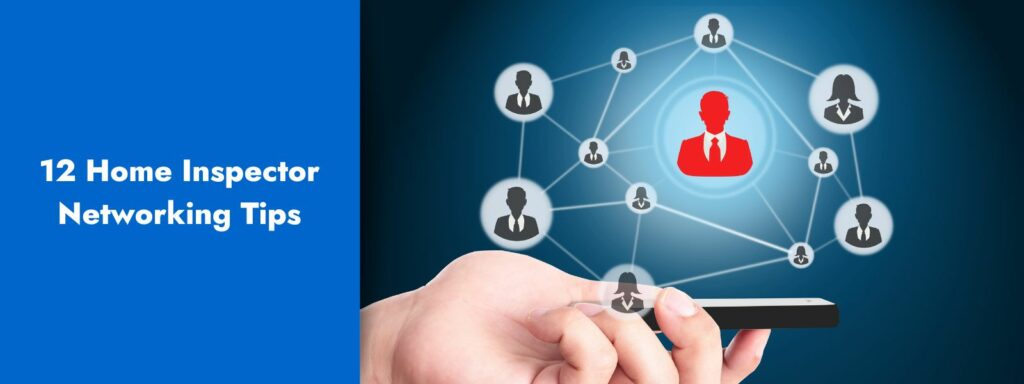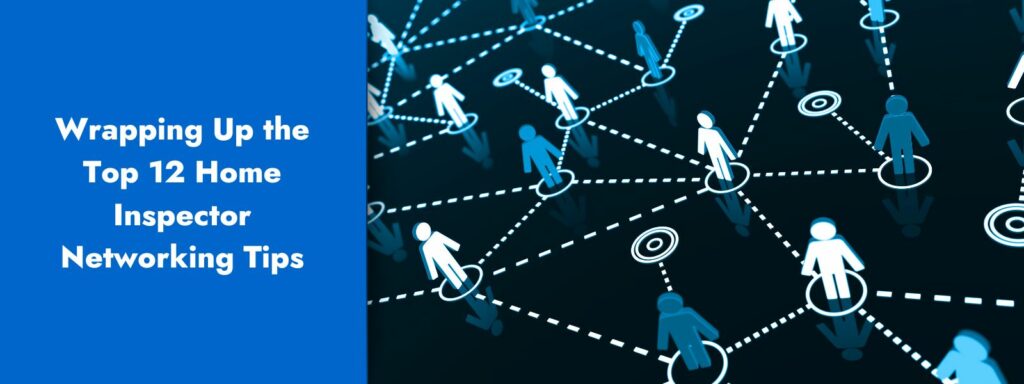Want to level up your business networking game? Check out these 12 home inspector networking tips to master the art of building relationships that can boost your business.
In the world of business networking, it’s not just about connecting with potential clients or customers. It’s about forming valuable connections with individuals who can refer business your way or spread positive word-of-mouth about your services. It’s also about connecting with people who can provide valuable information and training. You may also end up finding trustworthy vendors to hire for your own business.
Contrary to popular belief, networking isn’t just about asking for favors. Successful networkers understand that it’s all about fostering trust, building relationships, and forming genuine friendships with people.
To truly excel in networking, it’s important to offer support to others. That’s why the best networkers are often connectors who actively help others by referring customers, providing testimonials, or promoting events and other businesses.
Networking is a fundamental aspect of any successful business, and the field of home inspections is no exception. In a competitive industry like home inspections, establishing a strong network can be the key to thriving and expanding your business. Whether you’re a seasoned professional or just starting out, these 12 home inspector networking tips will help you grow your network and build a flourishing business.

What is networking & why should you bother with it?
Before delving into the tips for effective networking, it’s crucial to understand what networking truly means in the context of the home inspection industry. Networking is the process of establishing and nurturing professional relationships with individuals, organizations, and groups within your industry and related sectors. It involves actively engaging with peers, clients, real estate agents, and other professionals to exchange information, share experiences, and create opportunities for collaboration and growth.
Advantages of networking for home inspectors
Networking is more than just a social activity; it’s a strategic approach to building and expanding your business. Here are several compelling advantages of networking for home inspectors, supported by data and statistics:
Enhanced Reputation
Networking is an effective way to enhance your professional reputation. A strong network can lead to positive word-of-mouth referrals and recommendations. According to a Nielsen survey, 92% of people trust recommendations from friends and family over any other form of advertising. This trust can translate into increased credibility for your home inspection business, making potential clients more likely to choose your services.
Business Growth
Building a robust network can open doors to new business opportunities. According to a survey by Alignable, 85% of small businesses say word-of-mouth referrals are the primary way they acquire new customers. Networking allows you to tap into a referral network of real estate agents, contractors, and other professionals who can refer clients to your services. These referrals can significantly contribute to the growth of your business.
Industry Insights
Networking provides access to valuable industry insights. By connecting with peers and industry experts, you can stay updated on the latest trends, regulations, and best practices in the home inspection field. Staying informed is essential, as it helps you adapt to changing client expectations and regulatory requirements.
Client Trust
Clients often feel more comfortable hiring a home inspector who comes recommended by someone they know or trust. Networking can help you establish trust with potential clients. Data from the Deloitte Data shows that referred customers have a 37% higher retention rate than non-referred customers. This means that clients referred to you through your network are more likely to become loyal clients.
Collaborative Opportunities
Networking opens the door to collaborative opportunities. By connecting with contractors, real estate agents, and other professionals in the real estate industry, you can explore partnerships that benefit both parties. For example, you could collaborate with a contractor to offer bundled services, such as home inspections and repairs. This can increase your revenue while providing added convenience to clients.
Market Expansion
Networking allows you to expand your market reach. When you build relationships with real estate agents and other professionals in different geographical areas, you can receive referrals for inspections in new locations. This expansion can lead to a broader client base and increased business revenue. According to Small Business Trends, 85% of small businesses say word-of-mouth referrals are the number one way that new prospects find out about them.
Access to Resources
Networking provides access to valuable resources, such as industry-specific tools, software, and educational materials. Through your network, you can learn about the latest inspection technologies, the best home inspection software for report generation, and other resources that can improve your efficiency and service quality. Utilizing the right home inspection tools, equipment, and resources can lead to cost savings and improved client satisfaction.
Professional Development
Networking also supports your professional development. Engaging with experienced home inspectors can provide mentorship opportunities. A report by The American Society of Training and Development (ASTD) found that 75% of executives credit their success to mentoring. Learning from the experiences of others can help you navigate challenges and make informed decisions as you grow your home inspection business.
By actively networking and leveraging these advantages, you can position your home inspection business for long-term success and sustainable growth. Networking isn’t just about building a list of contacts; it’s about harnessing the power of relationships to create a thriving and reputable business.

12 Home Inspector Networking Tips to Grow Your Network & Build Your Business
1. Create an Elevator Pitch (Know Your Business)
An elevator pitch is your opportunity to make a memorable first impression. It’s a concise summary of your business, highlighting what sets you apart from the competition. In the world of home inspections, where credibility and expertise matter immensely, crafting a compelling elevator pitch is paramount.
Start by succinctly describing your years of experience, certifications, and any specialized services you offer. Mention any noteworthy statistics, such as the number of inspections you’ve conducted or your customer satisfaction rate. For instance, “As a certified home inspector with over a decade of experience, I’ve completed over 1,000 inspections with a 98% satisfaction rate.”
Backing up your pitch with concrete data and statistics can make it more convincing. Mentioning that you’ve helped clients save thousands of dollars by identifying hidden issues during inspections can also add weight to your pitch. The key here is to make potential clients or collaborators understand the value you bring to the table.
2. Carry Business Cards
Business cards may seem old-fashioned in the digital age, but they remain a vital networking tool. When you meet someone at an event or even during a routine inspection, handing over a well-designed business card can leave a lasting impression.
Include your name, contact information, and website on the card. You might also consider adding a QR code that links directly to your professional home inspection website or a client testimonial page. Ensure your cards are professional, easy to read, and visually appealing. A well-designed business card reflects positively on your professionalism.
3. Join Local Organizations
Networking begins right in your local community. Joining professional organizations related to home inspection, such as the American Society of Home Inspectors (ASHI) or the International Association of Certified Home Inspectors (InterNACHI), can provide numerous networking opportunities.
These organizations often host regular meetings, workshops, and conferences where you can connect with fellow inspectors, industry experts, and potential clients. By becoming a member and actively participating, you position yourself as a dedicated and committed professional in the eyes of your peers and clients.
4. Attend Local Events & Trade Shows
Local events and trade shows are excellent venues for expanding your network. These gatherings bring together a diverse group of professionals from various sectors of the real estate industry. You can meet real estate agents, builders, contractors, and potential clients under one roof.
Research local events and trade shows related to real estate and home improvement. Attend these with a clear networking strategy in mind. Bring your business cards and elevator pitch, and be prepared to engage in meaningful conversations. Keep track of the contacts you make and the leads generated from these events.
5. Get Involved in Your Community
Community involvement is not just about networking; it’s about building goodwill and trust. Consider sponsoring or participating in local charity events, homebuyer seminars, or neighborhood clean-up initiatives.
For example, you could offer free seminars on home maintenance to educate homeowners in your community. This not only positions you as an expert but also creates a positive image of your business within the community. Use these opportunities to connect with potential clients who may require your services in the future.
In addition to events, join local business associations, such as the Chamber of Commerce. These organizations often hold networking events where you can meet business owners and professionals from various industries, including real estate.
6. Share Your Knowledge (Blog / Newsletter)
Sharing your knowledge through blogging or newsletters is a powerful way to establish yourself as an industry authority. Regularly publish informative articles on topics related to home inspection, maintenance, and real estate.
In your blog or newsletter, don’t shy away from using data and statistics to back up your insights. For instance, you can write about the top five common issues found during inspections and provide statistics on the percentage of homes affected by each issue.
Additionally, track the performance of your blog or newsletter. Monitor metrics such as website traffic, email open rates, and click-through rates to gauge the impact of your content on your network and potential clients.
7. Leverage Social Media & Your Personal Network
In today’s digital age, social media is a goldmine for networking. Platforms like LinkedIn, Facebook, and Twitter provide opportunities to connect with peers, industry professionals, and potential clients.
Optimize your social media profiles with professional photos and detailed information about your services. Share valuable content, including industry news, tips for homeowners, and success stories from your inspections. Engage with your audience by responding to comments and messages promptly.
Utilize analytics tools provided by social media platforms to track the growth of your network. Measure the engagement with your content and assess which posts resonate most with your audience. This data-driven approach can help you refine your social media strategy for better networking results.
8. Partner With Realtors
Real estate agents are a crucial part of the home buying and selling process. Establishing strong relationships with realtors can be a game-changer for home inspectors. Realtors often recommend inspectors to their clients, and trust is at the core of these recommendations.
To effectively network with real estate agents:
- Attend realtor association events and meetings.
- Offer to provide educational sessions on home inspection for realtor teams.
- Share relevant market insights and statistics in your communications with realtors.
- Send personalized thank-you notes or small tokens of appreciation after successful collaborations.
Building a network of realtors who trust your expertise can lead to a steady stream of referrals, which can significantly boost your business.
9. Build Relationships With Clients
While it’s important to network with industry professionals, don’t overlook the value of building strong relationships with your clients. Happy clients can become your biggest advocates, referring friends and family to your services.
Ensure your inspections are thorough and your inspection reports are clear and easy to understand. Follow up with clients after inspections to address any questions or concerns they may have. Sending a follow-up email with a summary of your findings and recommendations can be a great way to maintain contact.
Consider creating a customer referral program where satisfied clients are incentivized to refer others. Offer discounts or small rewards as a token of appreciation for their referrals.
10. Offer Complementary Services (i.e. Energy Audits)
Expanding your range of services can make you a one-stop solution for homebuyers. One valuable complementary service is home energy audits. These audits assess a home’s energy efficiency and recommend improvements, which can be a compelling selling point for potential clients.
Utilize data to showcase the benefits of energy audits. Share statistics on how much money homeowners can save on energy bills after implementing recommended improvements. Highlight the environmental benefits as well, such as reduced carbon emissions.
To network effectively for energy audit services:
- Collaborate with local energy efficiency programs or organizations.
- Attend green building and sustainability events.
- Showcase case studies of homes where energy audits led to significant cost savings.
11. Find a Mentor
Finding a mentor in the home inspection industry can provide you with invaluable guidance and a network of connections. Look for experienced home inspectors who are willing to share their knowledge and experience.
A mentor can offer insights into the nuances of the industry, share tips on networking effectively, and introduce you to their own network contacts. Networking through mentorship can accelerate your professional growth.
When seeking a mentor, consider joining local home inspector associations or online forums where experienced inspectors may offer mentoring opportunities.
12. Follow up / Stay in Touch / Maintain Relationships
Maintaining relationships is as important as building them. After attending events, meeting potential clients, or collaborating with industry professionals, make it a point to follow up and stay in touch.
Use a customer relationship management (CRM) system to keep track of your network contacts. Set reminders for follow-up calls, emails, or meetings. Personalize your interactions by referencing previous conversations or shared interests.
Measure the effectiveness of your follow-up efforts by tracking the conversion rate of your network contacts into clients or referrals. A well-maintained network can yield ongoing business opportunities and referrals over time.

Wrapping Up the Top 12 Home Inspector Networking Tips
In the world of home inspections, networking is a cornerstone of success. Networking is an ongoing process that requires dedication and effort, but the rewards are well worth it. By implementing these 12 home inspector networking tips, you can grow your network, enhance your business, and become a trusted professional in your field.
Remember that networking is not just about making connections; it’s about nurturing them. Building meaningful relationships within your industry and community will not only boost your business but also contribute to your long-term success as a home inspector. Start building and nurturing your network today to secure a prosperous future as a home inspector.
Combine your networking strategy with the leading home inspection software from EZ HIS, and you’ll make yourself a household name. Feel free to contact us with any questions or try our software for yourself with our Free Trial!

